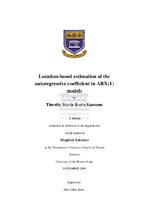Location-based estimation of the autoregressive coefficient in ARX(1) models
Abstract
In recent years, two estimators have been proposed to correct the bias exhibited by the leastsquares (LS) estimator of the lagged dependent variable (LDV) coefficient in dynamic regression models when the sample is finite. They have been termed as ‘mean-unbiased’ and ‘medianunbiased’ estimators. Relative to other similar procedures in the literature, the two locationbased estimators have the advantage that they offer an exact and uniform methodology for LS estimation of the LDV coefficient in a first order autoregressive model with or without exogenous regressors i.e. ARX(1). However, no attempt has been made to accurately establish and/or compare the statistical properties among these estimators, or relative to those of the LS estimator when the LDV coefficient is restricted to realistic values. Neither has there been an attempt to compare their performance in terms of their mean squared error (MSE) when various forms of the exogenous regressors are considered. Furthermore, only implicit confidence intervals have been given for the ‘medianunbiased’ estimator. Explicit confidence bounds that are directly usable for inference are not available for either estimator. In this study a new estimator of the LDV coefficient is proposed; the ‘most-probably-unbiased’ estimator. Its performance properties vis-a-vis the existing estimators are determined and compared when the parameter space of the LDV coefficient is restricted. In addition, the following new results are established: (1) an explicit computable form for the density of the LS estimator is derived for the first time and an efficient method for its numerical evaluation is proposed; (2) the exact bias, mean, median and mode of the distribution of the LS estimator are determined in three specifications of the ARX(1) model; (3) the exact variance and MSE of LS estimator is determined; (4) the standard error associated with the determination of same quantities when simulation rather than numerical integration method is used are established and the methods are compared in terms of computational time and effort; (5) an exact method of evaluating the density of the three estimators is described; (6) their exact bias, mean, variance and MSE are determined and analysed; and finally, (7) a method of obtaining the explicit exact confidence intervals from the distribution functions of the estimators is proposed. The discussion and results show that the estimators are still biased in the usual sense: ‘in expectation’. However the bias is substantially reduced compared to that of the LS estimator. The findings are important in the specification of time-series regression models, point and interval estimation, decision theory, and simulation.

